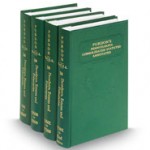Section §1501 of the Pennsylvania vehicle code refers to the general law that you must be licensed to drive a motor vehicle on all public and most private roads. Section (d) covers the states penalty for violating this statute. This does not cover the civil penalty imposed by the department of transportation. See § 1532 Suspension of operating privilege for more information about the suspension penalty assessed for multiple violations of Pennsylvania driver laws on § 1501.
§1501. Drivers required to be licensed.
(a) General rule.–No person, except those expressly exempted, shall drive any motor vehicle upon a highway or public property in this Commonwealth unless the person has a driver’s license valid under the provisions of this chapter. As used in this subsection, the term “public property” includes, but is not limited to, driveways and parking lots owned or leased by the Commonwealth, a political subdivision or an agency or instrumentality of either.
(b) Persons in towed vehicles.–No person, except those expressly exempted, shall steer or, while within the passenger compartment of the vehicle, exercise any degree of physical control of a vehicle being towed by a motor vehicle upon a highway in this Commonwealth unless the person has a valid driver’s license under the provisions of
this chapter for the type or class of vehicle being towed.
(c) Limitation on number of licenses.–No person shall receive a driver’s license unless and until the person surrenders to the department all valid licenses in the person’s possession issued by this or any other state. The department shall either return surrendered licenses issued by another state to that state or submit a list of the surrendered licenses to the state, together with information that the person is licensed in this Commonwealth. No person shall be permitted to have more than one valid driver’s license issued by this or any other state at any time. A nonresident who holds a nonresident commercial driver’s license issued by the Commonwealth under Chapter 16 (relating to commercial drivers) shall be permitted to have a regular driver’s license issued by the country of his residence.
(d) Penalty.–Any person violating subsection
(a) is guilty of a summary offense and shall, upon conviction, be sentenced to pay a fine of $200, except that, if the person charged furnishes satisfactory proof of having held a driver’s license valid on the last day of the preceding driver’s license period and no more than one year has elapsed from the last date for renewal, the fine shall be $25. No person charged with violating subsection (a) or (b) shall be convicted if the person produces at the office of the issuing authority within 15 days of the violation:
(1) a driver’s license valid in this Commonwealth at the time of the violation; or
(2) if the driver’s license is lost, stolen, destroyed or illegible, evidence that the driver was licensed at the time of the violation.
(July 1, 1981, P.L.202, No.63, eff. imd.; May 30, 1990, P.L.173, No.42; Dec. 18, 1992, P.L.1411, No.174, eff. 60 days; Dec. 21, 1998, P.L.1126, No.151, eff. 60 days)
1998 Amendment. Act 151 amended subsec. (c).
1992 Amendment. Act 174 amended subsec. (a).
1990 Amendment. Act 42 amended subsecs. (c) and (d), effective November 1, 1990, as to subsec. (c) and 60 days as to subsec. (d).
Special Provisions in Appendix. See section 4 of Act 143 of 1994 in the appendix to this title for special provisions relating to habitual offenders.
Cross References. Section 1501 is referred to in sections 1511, 1532, 6309.1, 6503 of this title.
The department shall suspend the operating privilege of any driver for six months upon receiving a certified record of the driver’s conviction of a subsequent offense under section 1501(a) (relating to drivers required to be licensed) if the prior offense occurred within five years of the violation date of the subsequent offense.
